Posted on October 18, 2008 by Eric Blair -
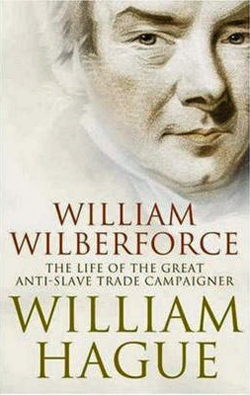
William Hague has written the life of William Wilberforce who was both a staunch conservative and a tireless campaigner against the slave trade. Hague shows how Wilberforce, after his agonising conversion to evangelical Christianity, was able to lead a powerful tide of opinion, as MP for Hull, against the slave trade, a process which was to take up to half a century to be fully realised. Indeed, he succeeded in rallying to his cause the support in the Commons Debates of some the finest orators in Parliament, having become one of the most respected speakers of those times. Hague examines twenty three crucial years in British political life during which Wilberforce met characters as varied as Louis XVI and Marie Antoinette, Tsar Alexander of Russia, and the one year old future Queen Victoria who used to play at his feet. He was friend and confidant of Pitt, Spencer Perceval and George Canning. He saw these figures raised up or destroyed in twenty three years of war and revolution. Hague presents us with a man who teemed with contradictions: he took up a long list of humanitarian causes, yet on his home turf would show himself to be a firm supporter of the instincts, interests and conservatism of the Yorkshire freeholders who sent him to Parliament. William Hague’s masterful study of this remarkable and pivotal figure in British politics brings to life the great triumphs and shattering disappointments he experienced in his campaign against the slave trade, and shows how immense economic, social and political forces came to join together under the tireless persistence of this unique man.
Posted on October 18, 2008 by The Orwell Prize -
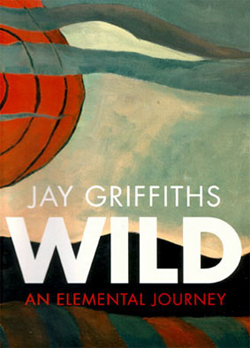
‘I took seven years over this work, spent all I had, my time, money and energy. Part of the journey was a green riot and part a deathly bleakness. I got ill, I got well. I went to the freedom fighters of West Papua and sang my head off in their highlands. I met cannibals infinitely kinder and more trustworthy than the murderous missionaries who evangelize them. I anchored a boat to an iceberg where polar bears slept; ate witchetty grubs and visited sea gypsies. I found a paradox of wildness in the glinting softness of its charisma, for what is savage is in the deepest sense gentle and what is wild is kind. In the end – a strangely sweet result – I came back to a wild home…’
Posted on October 18, 2008 by The Orwell Prize -

Drawing on a huge range of sources – letters, memoirs, conversations – Orlando Figes tells the story of how Russians tried to endure life under Stalin. Those who shaped the political system became, very frequently, its victims. Those who were its victims were frequently quite blameless. The Whisperers recreates the sort of maze in which Russians found themselves, where an unwitting wrong turn could either destroy a family or, perversely, later save it: a society in which everyone spoke in whispers – whether to protect themselves, their families, neighbours or friends – or to inform on them.
Posted on October 18, 2008 by The Orwell Prize -

From the much-loved, witty and excoriating voice of journalist Nick Cohen, a powerful and irreverent dissection of the agonies, idiocies and compromises of mainstream liberal thought. Nick Cohen comes from the Left. While growing up, his mother would search the supermarket shelves for politically reputable citrus fruit and despair. When, at the age of 13, he found out that his kind and thoughtful English teacher voted Conservative, he nearly fell off his chair: ‘To be good, you had to be on the Left.’ Today he’s no less confused. When he looks around him, in the aftermath of the invasion of Iraq, he sees a community of Left-leaning liberals standing on their heads. Why is it that apologies for a militant Islam that stands for everything the liberal-Left is against come from a section of the Left? After the American and British wars in Bosnia and Kosovo against Slobodan Milosevic’s ethnic cleansers, why were men and women of the Left denying the existence of Serb concentration camps? Why is Palestine a cause for the liberal-Left, but not, for instance, China, the Sudan, Zimbabwe or North Korea? Why can’t those who say they support the Palestinian cause tell you what type of Palestine they would like to see? After the 9/11 attacks on New York and Washington why were you as likely to read that a sinister conspiracy of Jews controlled American or British foreign policy in a liberal literary journal as in a neo-Nazi rag? It’s easy to know what the Left is fighting against – the evils of Bush and corporations – but what and, more to the point, who are they fighting for? As he tours the follies of the Left, Nick Cohen asks us to reconsider what it means to be liberal in this confused and topsy-turvy time. With the angry satire of Swift, he reclaims the values of democracy and solidarity that united the movement against fascism, and asks: What’s Left?
From the much-loved, witty and excoriating voice of journalist Nick Cohen, a powerful and irreverent dissection of the agonies, idiocies and compromises of mainstream liberal thought. Nick Cohen comes from the Left. While growing up, his mother would search the supermarket shelves for politically reputable citrus fruit and despair. When, at the age of 13, he found out that his kind and thoughtful English teacher voted Conservative, he nearly fell off his chair: ‘To be good, you had to be on the Left.’ Today he’s no less confused. When he looks around him, in the aftermath of the invasion of Iraq, he sees a community of Left-leaning liberals standing on their heads. Why is it that apologies for a militant Islam that stands for everything the liberal-Left is against come from a section of the Left? After the American and British wars in Bosnia and Kosovo against Slobodan Milosevic’s ethnic cleansers, why were men and women of the Left denying the existence of Serb concentration camps? Why is Palestine a cause for the liberal-Left, but not, for instance, China, the Sudan, Zimbabwe or North Korea? Why can’t those who say they support the Palestinian cause tell you what type of Palestine they would like to see? After the 9/11 attacks on New York and Washington why were you as likely to read that a sinister conspiracy of Jews controlled American or British foreign policy in a liberal literary journal as in a neo-Nazi rag? It’s easy to know what the Left is fighting against – the evils of Bush and corporations – but what and, more to the point, who are they fighting for? As he tours the follies of the Left, Nick Cohen asks us to reconsider what it means to be liberal in this confused and topsy-turvy time. With the angry satire of Swift, he reclaims the values of democracy and solidarity that united the movement against fascism, and asks: What’s Left?
Posted on October 18, 2008 by The Orwell Prize -

Rudyard Kipling was born in Bombay in 1865 and spent his early years there, before being sent, aged six, to England, a desperately unhappy experience. Charles Allen’s great-grandfather brought the sixteen-year-old Kipling out to Lahore to work on The Civil and Military Gazette with the words ‘Kipling will do’, and thus set young Rudyard on his literary course. And so it was that at the start of the cold weather of 1882 he stepped ashore at Bombay on 18 October 1882 – ‘a prince entering his kingdom’. He stayed for seven years during which he wrote the work that established him as a popular and critical, sometimes controversial, success. Charles Allen has written a brilliant account of those years – of an Indian childhood and coming of age, of abandonment in England, of family and Empire. He traces the Indian experiences of Kipling’s parents, Lockwood and Alice and reveals what kind of culture the young writer was born into and then returned to when still a teenager. It is a work of fantastic sympathy for a man – though not blind to Kipling’s failings – and the country he loved.
Posted on October 18, 2008 by The Orwell Prize -

The partition of India in 1947 promised its people both political and religious freedom – through the liberation of India from British rule, and the creation of the Muslim state of Pakistan. In reality the geographical divide effected an even greater schism of the population, benefiting the few at the expense of the very many, exposing huge numbers of the population to desperate and devastating consequences. Thousands of women were raped, at least one million people were killed, and ten- to fifteen-times that number were forced to leave their homes as refugees. It was one of the first, the most bloody, and remains one of the most significant, events of decolonisation in the twentieth century. In The Great Partition, Yasmin Khan examines the context, execution and aftermath of partition, integrating an incisive knowledge of political manoeuvres with a deeply-felt understanding of their fundamental social and cultural consequences. She exposes the obliviousness of the small elite driving division, as well as the majority of activists on both sides, to what partition would entail in practice and its effects on the populace. Its repercussions still resound today.Published to coincide with the 60th anniversary of partition, Yasmin Khan’s personal account draws together a fresh and considerable body of research, including many new interviews, newspaper extracts and archival sources, to reappraise independence and division and reinforce its catastrophic human cost. Intelligent, terrifying, wise and timely, The Great Partition is a testament to a country and people who were brutally and recklessly ripped apart.
Posted on October 18, 2008 by The Orwell Prize -
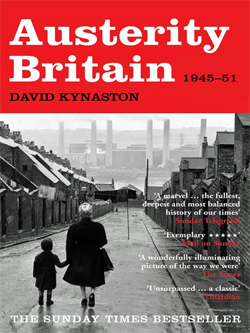
The groundbreaking series that will tell the story of Britain from VE Day in 1945 to the coming of Margaret Thatcher in 1979 as never before. Coursing through Austerity Britain is an astonishing variety of voices – vivid, unselfconscious, and unaware of what the future holds. A Chingford housewife endures the tribulations of rationing; a retired schoolteacher observes during a royal visit how well-fed the Queen looks; a pernickety civil servant in Bristol is oblivious to anyone’s troubles but his own. An array of working-class witnesses describe how life in post-war Britain is, with little regard for liberal niceties or the feelings of their ‘betters’. Many of these voices will stay with the reader in future volumes, jostling alongside well-known figures like John Arlott (here making his first radio broadcast, still in police uniform), Glenda Jackson (taking the 11+) and Doris Lessing, newly arrived from Africa, struck by the levelling poverty of postwar Britain. David Kynaston weaves a sophisticated narrative of how the victorious 1945 Labour government shaped the political, economic and social landscape for the next three decades. Deeply researched, often amusing and always intensely entertaining and readable, the first volume of David Kynaston’s ambitious history offers an entirely fresh perspective on Britain during those six momentous years.
Posted on October 18, 2008 by The Orwell Prize -
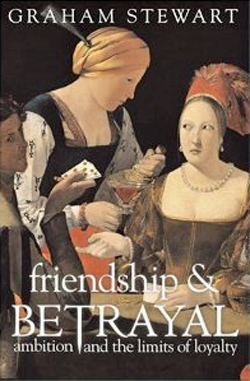
Drawing on a wide range of historical examples, Graham Stewart explores the intriguing question of whether friendship can survive the pressures of public life. He examines in detail three relationships from across centuries and nations to illustrate how people in power cope with the pleasures and pitfalls of friendship in public life. His first example, Courtiers, tells the story of Queen Anne and Sarah, Duchess of Marlborough, and shows how the introduction of a new ‘favourite’ can ensure a powerfully jealous reaction from the long standing friend who is displaced. His second example, Revolutionaries, relates the tale of one of the United States’ greatest Founding Fathers, Benjamin Franklin, and his relationship with his longest serving political partner, Joseph Galloway. Here were two ambitious men whose friendship was broken in bitterness by divided loyalties during the American War of Independence. The third example, Liberals, brings us back to Britain and the friendship between Herbert Henry Asquith and his best friend Richard Burdon Haldane. Their relationship helped ensure that one became Prime Minister and the other Lord Chancellor, but as Stewart sums up ‘with success came harsh political necessities, and only one of them was marked out to pay the sacrifice.’ Indeed it is Stewart’s view that ‘great leaders usually find that when they reach the summit they are alone.’ We see how single-mindedness, indeed selfishness, appears a necessary quality in the scramble for preferment and how friendship can so quickly turn into rivalry. Incisive and thought-provoking, Friendship & Betrayal is a fascinating examination of an age old dilemma that continues to animate public life today.
Posted on October 18, 2008 by The Orwell Prize -

Explosively personal account by a British lawyer who defends Death Row prisoners and Guantanamo Bay detainees. Clive Stafford Smith is the 46-year-old human-rights lawyer who has famously – some would say notoriously – spent more than twenty years in the United States representing prisoners on Death Row. His clients include many detainees in Guantanamo Bay in Cuba, and he established the London-based charity Reprieve, developed to defending human rights in 1999. His book is quite simply, devastating, and many will laugh and cry reading it: laugh in disbelief, and cry in despair at the utter inhumanity and lack of imagination wrapped up in hypocrisy so enormous that it beggars understanding. Yet even in the face of insurmountable odds, Clive Stafford Smith remains an optimist. Few could maintain his capacity for work and his commitment to his clients if he allowed frustration or despair to divert him. His experiences, graphically recounted in this book, have enabled him to shine a bright, unblinking light into the darkest corners of illegality that are being justified by governments in the name of the War on Terror.
Posted on October 18, 2008 by Eric Blair -
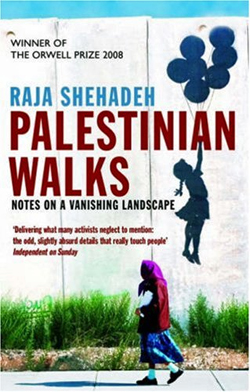
Palestine is a land of biblical beauty – of olive groves, grapevines, stone buildings, rolling hills, wadis and cliffs. It is also a land of violence and war. Human rights lawyer and writer Raja Shehadeh has lived on the West Bank since his family fled Jaffa in 1948. A peace activist of independent temper, he has seen at first hand the horrors of occupation – including the siege of Ramallah. For decades Raja has found comfort in walking, following what in Arab culture is called sarha – meaning to roam freely, at will, without restraint: to go where the spirit takes you.
In Palestinian Walks he invites the reader to come along for the unique experience of a sarha in Palestine. The six walks that comprise the book span a period of twenty six years evoking the land, its history and some of Palestinian’s political struggles, disappointments and hope. Palestinian Walks describes a vanishing landscape. Raja takes us to beautiful hills, past rivers and sacred springs, to famous landmarks from A’yn Qenya, the Shukba Caves, from Wadi Qelt to the Dead Sea (now receding by a metre every year thanks to Israel’s diversion of the river Jordan, an environmental catastrophe in the making).
We take a walk with Selma Hasan, a PLO functionary from Tunis, who returned after the Oslo Accords (a settlement that undermined decades of Raja’s legal work on land rights). And we experience the everyday humiliations and harassment by Israeli soldiers – including a chance meeting with a settler who lives next to Raja’s hometown. But there are also moments of extraordinary beauty:
To my left at the perfectly still waters of the [Dead] Sea, transformed by the sun into a luminous platinum sheet, and to my right at the formidable wall of incandescent rock along which we were travelling, towering steeply, challengingly, seemingly an impenetrable line of defence, a mighty gateway into another world.
Palestinian Walks shows how Raja’s life, and the fate of the landscape are utterly intertwined. It is an intensely personal account of life in one of the world’s most troubled regions, and a poignant story of how a pleasure so many of us take for granted – the freedom to roam through the countryside – is being destroyed.
Posted on October 18, 2008 by The Orwell Prize -

Tim Phillips’ book tells the human story of the siege – of the terrible toll that thirst, hunger and sleeplessness took on the hostages, of the bravery of those who dealt with the terrorists, such as the elderly headmistress of the school and the doctor who tried to relieve the suffering of the young children. Phillips also looks at the authorities’ response to the siege and finds it severely wanting. He has spent time in Beslan researching the book, talking to those involved and those affected, listening to the conspiracy theories, and trying to set the events of September 2004 in their wider context of centuries of conflict and enmity in the Caucasus.
Posted on October 18, 2008 by The Orwell Prize -

An eye-opening and vital account of the future of our earth, and our civilisation, if current rates of global warming persist, by the highly acclaimed author of High Tide. Picture yourself a few decades from now, in a world in which average temperatures are three degrees higher than they are now. On the edge of Greenland, rivers ten times the size of the Amazon are gushing off the ice sheet into the north Atlantic. Displaced victims of North Africa’s drought establish a new colony on Greenland’s southern tip, one of the few inhabitable areas not already crowded with environmental refugees. Vast pumping systems keep the water out of most of Holland, but the residents of Bangladesh and the Nile Delta enjoy no such protection. Meanwhile, in New York, a Category 5-plus superstorm pushes through the narrows between Staten Island and Brooklyn, devastating waterside areas from Long Island to Manhattan. Pakistan, crippled by drought brought on by disappearing Himalayan glaciers, sees 27 million farmers flee to refugee camps in neighbouring India. Its desperate government prepares a last-ditch attempt to increase the flow of the Indus river by bombing half-constructed Indian dams in Kashmir. The Pakistani president authorises the use of nuclear weapons in the case of an Indian military counter-strike. But the biggest story of all comes from South America, where a conflagration of truly epic proportions has begun to consume the Amazon… Alien as it all sounds, Mark Lynas’s incredible new book is not science-fiction; nor is it sensationalist. The title, Six Degrees, refers to the terrifying possibility that average temperatures will rise by up to six degrees within the next hundred years. This is the first time we have had a reliable picture of how the collapse of our civilisation will unfold unless urgent action is taken. Most vitally, Lynas’s book serves to highlight the fact that the world of 2100 doesn’t have to be one of horror and chaos. With a little foresight, some intelligent strategic planning, and a reasonable dose of good luck, we can at least halt the catastrophic trend into which we have fallen – but the time to act is now.
Posted on October 18, 2008 by Eric Blair -

A field of strawberries in Kent… And sitting in it two caravans – one for the men and one for the women. The residents are from all over: miner’s son Andriy is from the old Ukraine, while sexy young Irina is from the new: they eye each other warily. There are the Poles Tomasz and Yola, two Chinese girls and Emanuel from Malawi. They’re all here to pick strawberries in England’s green and pleasant land. But these days England’s not so pleasant for immigrants. Not with Russian gangster-wannabes like Vulk, who’s taken a shine to Irina and thinks kidnapping is a wooing strategy. And so Andriy – who really doesn’t fancy Irina, honest – must set off in search of that girl he’s not in love with.
Posted on October 18, 2008 by The Orwell Prize -

A History of Modern Britain confronts head-on the victory of shopping over politics. It tells the story of how the great political visions of New Jerusalem or a second Elizabethan Age, rival idealisms, came to be defeated by a culture of consumerism, celebrity and self-gratification. In each decade, political leaders think they know what they are doing, but find themselves confounded. Every time, the British people turn out to be stroppier and harder to herd than predicted. Throughout, Britain is a country on the edge – first of invasion, then of bankruptcy, then on the vulnerable front line of the Cold War and later in the forefront of the great opening up of capital and migration now reshaping the world. This history follows all the political and economic stories, but deals too with comedy, cars, the war against homosexuals, Sixties anarchists, oil-men and punks, Margaret Thatcher’s wonderful good luck, political lies and the true heroes of British theatre.
Posted on October 19, 2007 by The Orwell Prize -
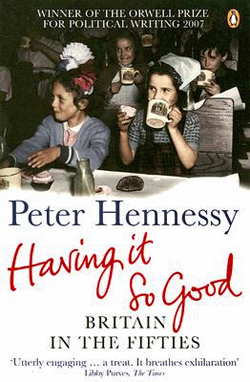
Having It So Good evokes Britain emerging from the shadow of war and the privations of austerity and rationing into growing affluence. Peter Hennessy takes his readers into the front-rooms where the Coronation was watched on television, to the classrooms and now coffee bars of 1950s Britain – and also into the secret Cabinet rooms in which decisions about the British nuclear bomb were taken and plans made for the catastrophe of nuclear war. He brings to life the ageing Churchill, in his last faltering spell as Prime Minister, the highly-strung Anthony Eden taking his country to war in the teeth of American opposition and world opinion, and the rise of ‘Supermac’ Harold Macmillan, gliding over problems with his Edwardian insouciance.
Above all, Having It So Good captures the smell and the flavour of an extraordinary decade in which affluence and anxiety combined to produce their own winds of change.
The judges said:
A marvellous history which seamlessly places high, intimate political history of the 50s, nuclear planning, Suez, and its characters in the context of British holidays and ice-cream. It re-invents history, all exuberantly done in Peter’s inimitable voice.
Posted on October 19, 2006 by The Orwell Prize -
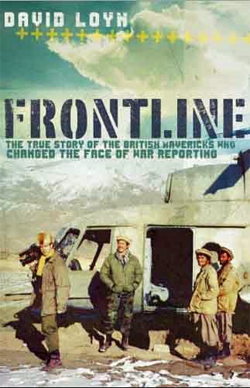
Rory Peck, Peter Jouvenal, Vaughan Smith, and Nicholas Della Casa were the founder members of an exclusive and dangerous club: the Frontline TV News Agency. Between them, this colourful collection of adventurers and ex-army officers captured some of the key images at the end of the Cold War, and the fractured, fissile world which emerged. Two of them are now dead: killed in action. The way they lived and died was an anachronism; they were eccentrics who might have been happier fighting wars in the British Empire a century before. Instead, they brought back pictures from the worst war zones the late twentieth century had to offer. And it suited them. For the men of Frontline, how things were done was as important as what was done. All four of the founders, and those they recruited, shared the same panache, wit, and disdain for authority, planning the next trip to the Hindu Kush in the bar of the Ritz. Their story reads like a latter-day Rudyard Kipling adventure. But while their lives may have been lived as if they were still playing the Great Game, they also cared passionately about their work and the truth it conveyed. Part Bang Bang Club, part Flashman, Frontline is the gripping story of lives lived to the full in some of the worst places on earth.
Posted on October 19, 2006 by The Orwell Prize -

When Julia flies in to war-scarred Sierra Leone from London, she is apprehensive about seeing her uncle Moses for the first time in twenty years. But nothing could have prepared her for her encounter with her eight-year-old cousin, Citizen, a former child soldier, and for the shocking truth of what he has done. Driven by a desire to understand Citizen, Julia takes the disturbed child into the ‘bush’. There they meet other child soldiers, and a storyteller, Bemba G., who provides a safe haven for them all and strives to return them to childhood through play, love, story-telling and performance. As Julia gradually rediscovers Africa, the different generations of her family rediscover their bonds. And then Bemba G. directs the child soldiers in a version of Shakespeare’s Julius Caesar, with powerful effect.
The judges said:
Anyone who has spent time in Africa can immediately recognise the power and truth of her descriptions. It is a work of great intimacy and moral complexity, the kind of writing that sheds light on a world we barely understand…the book is one that Orwell himself might have liked.
Posted on October 19, 2005 by The Orwell Prize -

A journalistic memoir from one of the most recognisable TV news correspondents in the UK. How do you decide what is a ‘story’ and what isn’t? What does a newspaper editor actually do all day? How do hacks get their scoops? How do the TV stations choose their news bulletins? How do you persuade people to say those awful, embarassing things? Who earns what? How do journalists manage to look in the mirror after the way they sometimes behave? The purpose of this insider’s account is to provide an answer to all these questions and more. Andrew Marr’s brilliant, and brilliantly funny, book is a guide to those of us who read newspapers, or who listen to and watch news bulletins but want to know more. Andrew Marr tells the story of modern journalism through his own experience. This is an extremely readable and utterly unique modern social history of British journalism, with all its odd glamour, smashed hopes and future possibility.

















